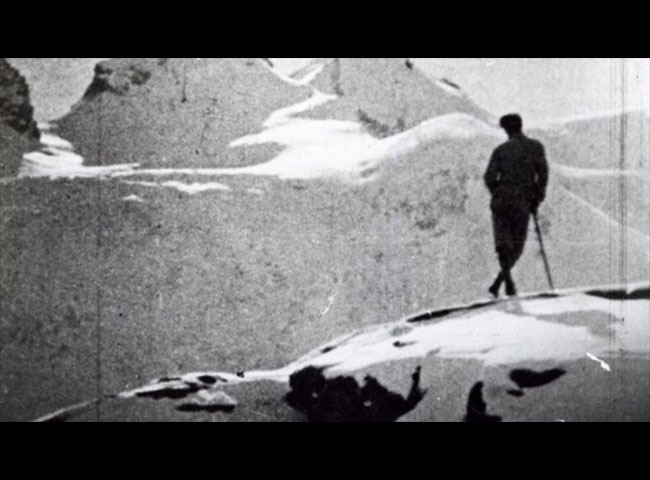Du pôle à l'Équateur
-
Réalisé par Yervant Gianikian, Angela Ricci Lucchi • Écrit par Yervant Gianikian, Angela Ricci Lucchi
-
Italie • 1986 • 98 minutes • 16 mm • Couleur et Noir & Blanc
- Réalisation :
Yervant Gianikian, Angela Ricci Lucchi - Écriture :
Yervant Gianikian, Angela Ricci Lucchi - Image :
Yervant Gianikian, Angela Ricci Lucchi - Montage :
Donn Alan Pennebaker - Musique originale :
Keith Ullrich, Charles Anderson
- Production (structure) :
Yervant Gianikian - Coproduction :
Angela Ricci Lucchi - Diffuseur :
ZDF - Zweites Deutsches Fernsehen - Ayant droit :
Yervant Gianikian
- N° ISAN :
non renseigné
Résumé
Ce film fondateur et magistral arpente les pellicules impressionnées à travers le monde par les opérateurs de Luca Comerio, documentariste pionnier italien oublié, ami de Gabriele d’Annunzio, qui travailla pour le roi puis le gouvernement fasciste. Partant d’un hypnotique trajet en train au milieu des montagnes tyroliennes, le film fait resurgir de notre conscience les images de la conquête coloniale fasciste, les liant intimement à de violentes images de chasse. Pour composer ce voyage à travers le début du XXe siècle, les deux cinéastes perfectionnent leur “ caméra analytique ”, outil de montage et technique de parcours dans l’image : celle-ci re-filme, détaille le photogramme, le ralentit, le monte, le colorise parfois pour l’analyser. Pendant cinq ans, les cinéastes ont cheminé parmi les 347 000 photogrammes en état d’“ amnésie chimique ” pour venir redonner un sens à ces histoires émouvantes et révoltantes et éclairer l’idéologie que ces images contiennent. ”
(Texte de présentation du film lors de la rétrospective au Centre Pompidou en 2015)
Drawing upon turn-of-the-century film from regions that were then fabulously exotic and assembling it at a sleepwalker’s pace, this film uses changeable color tints and a humming electronic score.
The title Dal polo all'equatore was first used by the pioneering documentary maker, Luca Comerio, for a compilation film of 1925; it was used again by Yervant Gianikian and Angela Ricci Lucchi for their film of 1985. Much of the original has been re-worked: the 'found footage' has been re-shot, slowed down, tinted, and re-edited with a sound track of minimalist composition. As a result, the exotica of colonial travel and sport take on new and sinister meanings. The acts of violence, especially those of hunting, recur in patterns that suggest visually that war is a logical development. A close examination of the work, starting with the opening sequence of a railway journey, explores the centrality of questions of memory and history to this remarkable and influential film.
Mot(s)-clé(s) thématique(s)
Sélections et distinctions
- 1987 • IFFR - International Film Festival Rotterdam • Rotterdam (Pays-Bas) • Sélection
Comment avoir accès au film ?
-
Édition DVD
- Il n'existe pas d'édition DVD à notre connaissance
-
Accès VOD
- Il n'existe pas d'accès en VOD à notre connaissance
- Distribution
- Aide sur les moyens d'accéder à un film
